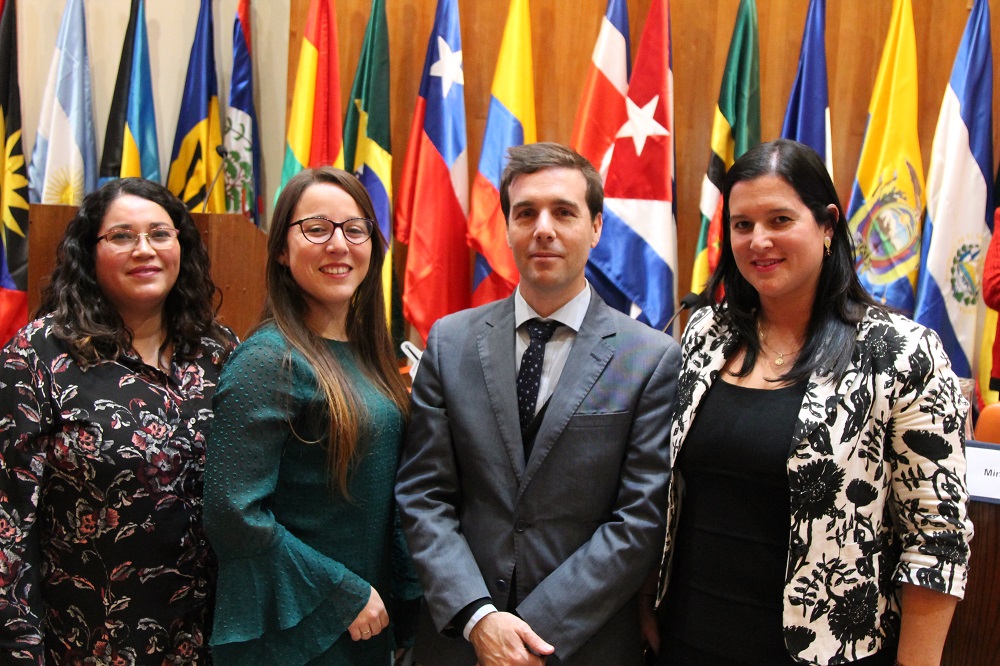Chile: the importance of Codex Alimentarius in food production and trade.
The Chilean Codex Alimentarius Secretariat, ACHIPIA, organized a seminar on 5 June 2019 entitled “Codex Alimentarius: Strengthening food safety in trade”. The aim was to attract and increase the participation of different sectors of the food industry in the national sub-committees. Speakers from the food industry association explained to participants how Codex standards and their application in production processes, help them in complying with national and international regulations on food safety and facilitating food trade, using concrete examples in which actions were directly related to Codex standards.
Cassandra Pacheco, National Codex Contact Point said, “In Chile we have a national structure for the analysis of standards that is open, inclusive and dynamic, and we all benefit when everybody is an active part of the preparation of national positions”.

Karla Carmona, Cassandra Pacheco, Diego Varela, Constanza Vergara
Diego Varela, Chair of the Regional Coordinating Committee explained to participants that the relationship between food safety and international food trade has been recognized by the World Trade Organization as a key area that requires, more than ever, joint efforts “to ensure that global agri-food chains are capable of supplying the population with safe food”.
Marisol Figueroa, representing the food industry reminded participants that Codex is at the service of consumers, and that Codex standards provide benefit when they are elaborated in a participatory manner by all actors in the food chain. Luisa Kipreos from the nutrition and food department in the Ministry of Health and Agriculture and Livestock Service reiterated their belief that industry and government share the same goal, that is, to ensure that the population has stable availability of safe food in Chile and in the countries to which they export.
“National processes of participation in Codex are inclusive”, said Constanza Vergara, coordinator of the national subcommittee of the Codex food hygiene committee, “especially industry, since they are the ones that are ultimately responsible for producing food and applying these standards”, she said.
Read more
Codex regional web pages for Latin America and the Caribbean
At the heart of the Codex mandate are the core values of collaboration, inclusiveness, consensus building and transparency. Governmental and non-governmental, public and private organizations alike play a vital role in ensuring Codex texts are of the highest quality and based on sound science.
Codex would have little authority in the field of international standard setting if it did not welcome and acknowledge the valuable contributions made by observers. Expert technical bodies, industry and consumer associations
contribute to the standard-setting process in a spirit of openness, collaboration and transparency.
Intergovernmental organizations (IGOs) and international non-governmental organizations (NGOs) can apply for observer status in Codex in order to attend and put forward their views at every stage of the standard-setting process.
 Current Codex Alimentarius Commission
Current Codex Alimentarius Commission
Chile: the importance of Codex Alimentarius in food production and trade.
The Chilean Codex Alimentarius Secretariat, ACHIPIA, organized a seminar on 5 June 2019 entitled “Codex Alimentarius: Strengthening food safety in trade”. The aim was to attract and increase the participation of different sectors of the food industry in the national sub-committees. Speakers from the food industry association explained to participants how Codex standards and their application in production processes, help them in complying with national and international regulations on food safety and facilitating food trade, using concrete examples in which actions were directly related to Codex standards.
Cassandra Pacheco, National Codex Contact Point said, “In Chile we have a national structure for the analysis of standards that is open, inclusive and dynamic, and we all benefit when everybody is an active part of the preparation of national positions”.

Karla Carmona, Cassandra Pacheco, Diego Varela, Constanza Vergara
Diego Varela, Chair of the Regional Coordinating Committee explained to participants that the relationship between food safety and international food trade has been recognized by the World Trade Organization as a key area that requires, more than ever, joint efforts “to ensure that global agri-food chains are capable of supplying the population with safe food”.
Marisol Figueroa, representing the food industry reminded participants that Codex is at the service of consumers, and that Codex standards provide benefit when they are elaborated in a participatory manner by all actors in the food chain. Luisa Kipreos from the nutrition and food department in the Ministry of Health and Agriculture and Livestock Service reiterated their belief that industry and government share the same goal, that is, to ensure that the population has stable availability of safe food in Chile and in the countries to which they export.
“National processes of participation in Codex are inclusive”, said Constanza Vergara, coordinator of the national subcommittee of the Codex food hygiene committee, “especially industry, since they are the ones that are ultimately responsible for producing food and applying these standards”, she said.
Read more
Codex regional web pages for Latin America and the Caribbean
 Codex and Observer
Codex and Observer
around the world since ancient times.
We might not always know where it comes from,
but we expect it to be available, safe and of good quality.









Leave a comment